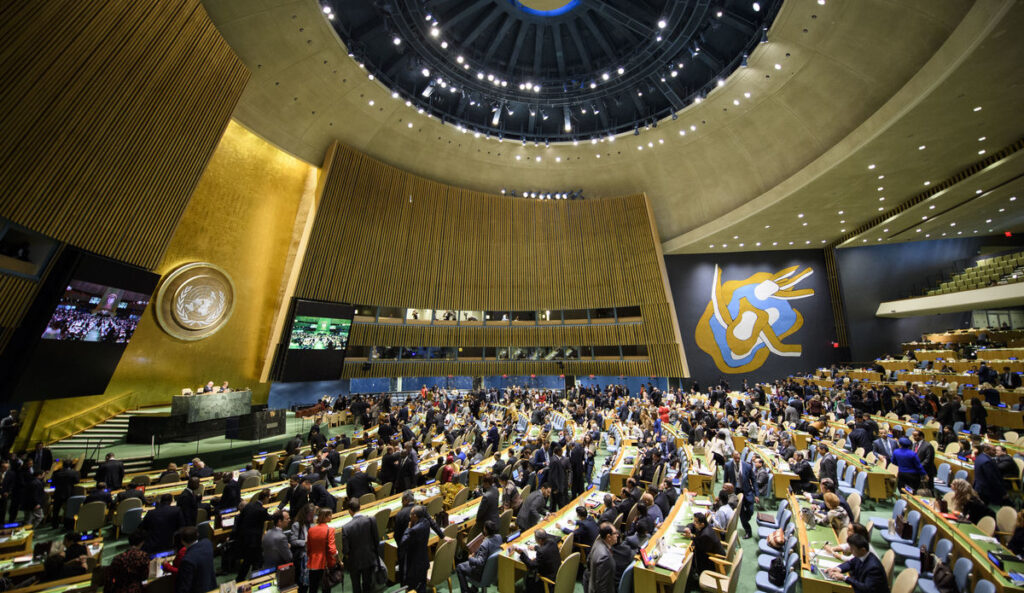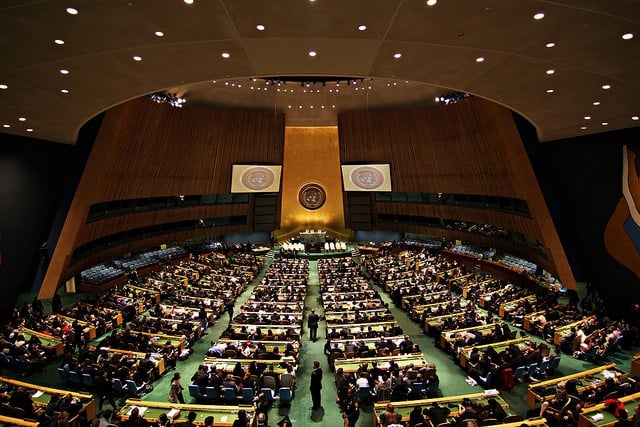UN GENERAL ASSEMBLY 2023
INTRODUCTION
The United Nations General Assembly (UNGA) convened in New York in September 2023 under the compelling theme, “Rebuilding Trust and Reigniting Global Solidarity: Accelerating Action on the 2030 Agenda and its Sustainable Development Goals Towards Peace, prosperity, progress, and Sustainability for All.” This global event gathered world leaders, diplomats, and stakeholders to address the most pressing challenges facing humanity. In this comprehensive analysis, we delve into the major takeaways from this landmark UNGA meeting, exploring how the theme reverberated through various discussions and initiatives.

A STRENGTHENED COMMITMENT TO SUSTAINABLE DEVELOPMENT GOALS (SDGS)
The 2030 Agenda for Sustainable Development took center stage at the UNGA 2023, with a renewed commitment to accelerate progress towards its 17 Sustainable Development Goals (SDGs). Leaders emphasized the urgent need to rebuild trust in the international community’s capacity to achieve these goals. It was recognized that sustainable development is not only essential for addressing global challenges but also for fostering peace, prosperity, and global solidarity.
However, progress towards the SDGs was extensively reviewed. While some achievements were celebrated, many nations acknowledged that more robust efforts were required, particularly in addressing poverty, inequality, and climate change. The assembly agreed on the necessity of aligning national policies with the SDGs and mobilizing resources to bridge the funding gap, demonstrating a commitment to global solidarity.
CLIMATE ACTION AS A CORNERSTONE OF SOLIDARITY
Within the broader context of rebuilding trust and solidarity, climate action emerged as a cornerstone. The impending COP29 in Brazil was a focal point of discussions, with leaders recognizing the urgency of the climate crisis and the necessity for bold, collective action. Countries pledged to enhance their climate commitments, emphasizing that addressing climate change transcends borders and demands global cooperation.
In addition, the assembly called for a holistic approach to climate action, encompassing not only emissions reduction but also climate adaptation and resilience-building, especially in vulnerable communities. The transition to renewable energy, reforestation efforts, and technology sharing were identified as key drivers of progress in the fight against climate change.
DIPLOMACY AND CONFLICT RESOLUTION
In the pursuit of rebuilding trust and global solidarity, the UNGA 2023 tackled several ongoing geopolitical conflicts and tensions. Diplomats and leaders engaged in dialogue to seek peaceful solutions to crises such as the Ukraine situation, the Israel-Palestine conflict, and regional disputes in the South China Sea. The commitment to diplomacy, dialogue, and adherence to international law emerged as crucial factors in preventing further escalations and fostering lasting peace.
Also, the international community collectively acknowledged that conflicts are a hindrance to achieving the 2030 Agenda’s goals. Therefore, resolution efforts were seen as not only morally imperative but also essential for global stability and progress.
GLOBAL HEALTH AND PANDEMIC PREPAREDNESS
The COVID-19 pandemic remained a dominant concern, illustrating the necessity of international cooperation and solidarity in addressing global health crises. Leaders emphasized the importance of equitable vaccine distribution and access to healthcare. The assembly called for the strengthening of the World Health Organization (WHO) and the establishment of a comprehensive global pandemic response framework.
So, they regarded pandemic preparedness as a vital component of rebuilding trust in the international community’s capacity to respond effectively to global challenges. Nations acknowledged the importance of sharing knowledge, resources, and expertise to ensure a coordinated and efficient response to future health emergencies.
TECHNOLOGY AND CYBERSECURITY
They explored the digital age and the increasing role of cyberspace in global affairs through the lens of rebuilding trust and solidarity. Discussions revolved around the responsible use of artificial intelligence, data privacy, and the need for robust cybersecurity measures. Member states recognized the potential benefits of digital technology in achieving sustainable development but also stressed the importance of addressing the associated risks.
In addition, the consensus at the UNGA was that building trust in technology requires clear regulations and international cooperation. They discussed cybersecurity measures to protect nations from digital threats and promote responsible AI and data practices.
HUMAN RIGHTS AND GENDER EQUALITY
The UN General Assembly 2023 reaffirmed its commitment to human rights and gender equality, recognizing them as integral to global solidarity and progress. Leaders discussed the imperative of protecting and promoting the rights of marginalized communities, including refugees and migrants. Gender equality was a central theme, with calls for greater representation of women in leadership roles and efforts to combat gender-based violence and discrimination.
Moreover, rebuilding trust and global solidarity necessitated addressing disparities and ensuring that all individuals enjoy their fundamental rights and opportunities.
HUMANITARIAN ASSISTANCE AND REFUGEES
The global humanitarian crisis remained a pressing concern. Member states pledged to increase support for humanitarian assistance and refugee resettlement, reflecting a commitment to shared responsibility. Discussions revolved around addressing the root causes of displacement and conflict, providing adequate humanitarian funding, and ensuring the safety and dignity of refugees and internally displaced persons.
Also, the international community recognized that solidarity extends to those most vulnerable and affected by crises, underscoring the need for collective action.
CONCLUSION
In conclusion, the UN General Assembly 2023, framed by the theme of rebuilding trust and fostering global solidarity, epitomized the imperative of unified action. The assembly, attended by leaders and representatives from across the globe, highlighted the shared commitment to a future characterized by peace, prosperity, progress, and sustainability. The resonance of this commitment reverberated throughout the discussions, underlining the significance of multilateral cooperation in addressing the world’s most pressing challenges.
Moreover, this session provided a platform for a renewed dedication to the Sustainable Development Goals (SDGs), emphasizing their integral role in shaping a sustainable and equitable future. Countries pledged to accelerate efforts to combat climate change, recognizing it as a universal concern transcending borders, underscoring the urgency of climate action.
However, in the realm of diplomacy and conflict resolution, the assembly demonstrated the capacity for dialogue and adherence to international law as pivotal tools in ensuring global stability. The response to the ongoing COVID-19 pandemic showcased the importance of equitable access to healthcare and the need for a comprehensive pandemic response framework.
Meanwhile, the digital age, marked by technological advancements, prompted discussions on responsible technology use and the necessity of robust cybersecurity measures. Gender equality and human rights emerged as non-negotiable principles, integral to the pursuit of global solidarity. Also, amid the myriad discussions and pledges, the session resonated with a resounding call for humanitarian assistance and support for refugees, reaffirming the global community’s commitment to safeguarding the most vulnerable.
In summation, the UNGA 2023 served as a testament to the international community’s collective resolve to navigate a complex and interconnected world. The takeaways from this historic assembly underscore the significance of unity, cooperation, and trust as the world endeavors to realize a brighter, more equitable, and sustainable future for all.


